Diversity Training Manual: Business and Ethics Analysis Report
VerifiedAdded on 2022/10/01
|9
|1942
|244
Report
AI Summary
This report is a comprehensive analysis of a diversity training manual, focusing on the accommodation of various religious groups (Orthodox Judaism, Hinduism, and Islam) within the framework of civil rights. It examines specific practices such as assimilation, dietary restrictions (Kosher), religious observances (Shabbat, Ramadan, Salat), and cultural practices, considering their compatibility with workplace policies. The report delves into the concept of affirmative action, its legislative intent, and the landmark Bakke v. Regents case, exploring its positive and negative effects. It highlights the importance of anti-discrimination policies in addressing challenges related to race, caste, creed, color, sex, and religion in the workplace, emphasizing the need for equal opportunities and a commitment to fostering an inclusive environment. The manual underscores the company's stance against discrimination and violence, while respecting personal choices that do not affect others.
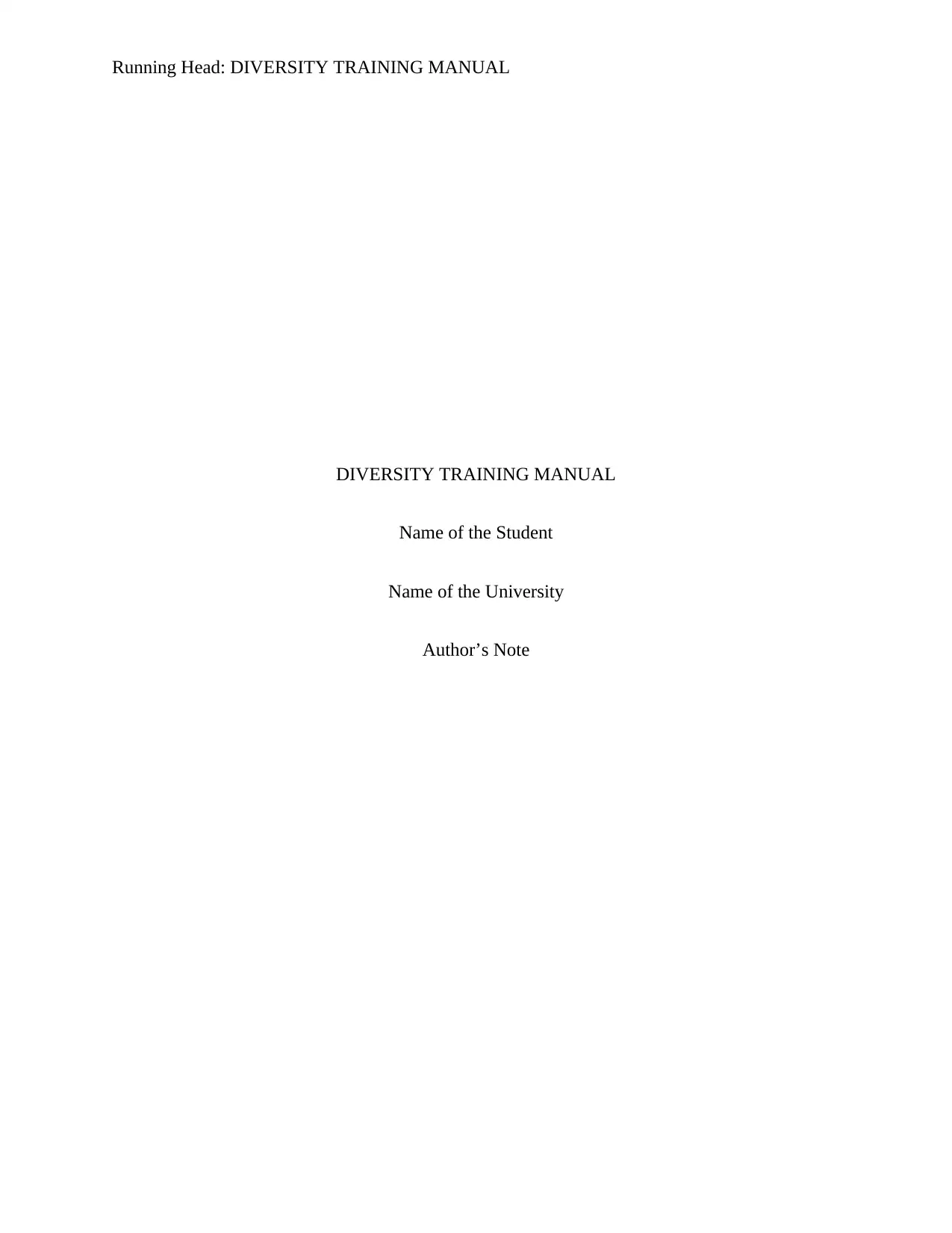
Running Head: DIVERSITY TRAINING MANUAL
DIVERSITY TRAINING MANUAL
Name of the Student
Name of the University
Author’s Note
DIVERSITY TRAINING MANUAL
Name of the Student
Name of the University
Author’s Note
Paraphrase This Document
Need a fresh take? Get an instant paraphrase of this document with our AI Paraphraser
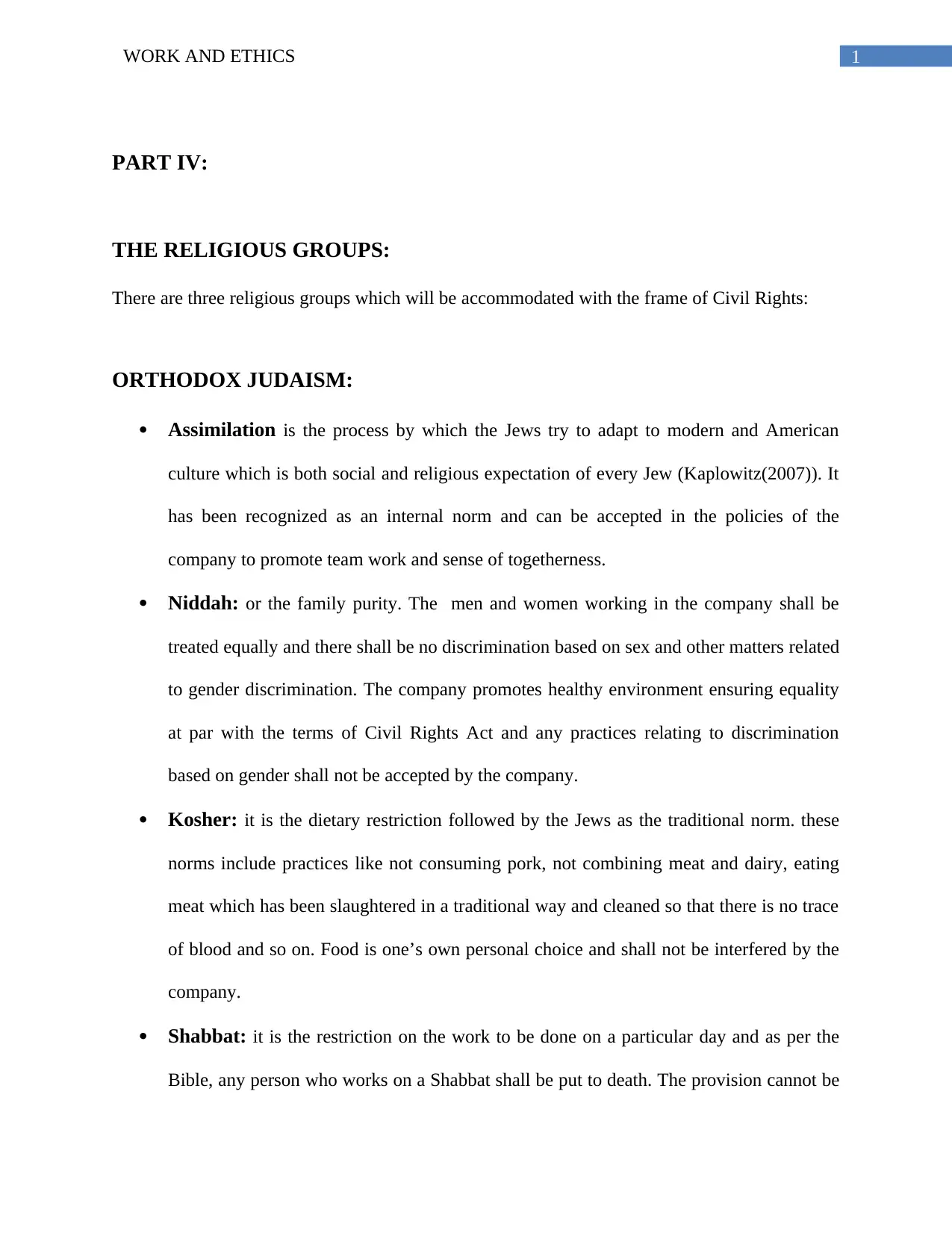
1WORK AND ETHICS
PART IV:
THE RELIGIOUS GROUPS:
There are three religious groups which will be accommodated with the frame of Civil Rights:
ORTHODOX JUDAISM:
Assimilation is the process by which the Jews try to adapt to modern and American
culture which is both social and religious expectation of every Jew (Kaplowitz(2007)). It
has been recognized as an internal norm and can be accepted in the policies of the
company to promote team work and sense of togetherness.
Niddah: or the family purity. The men and women working in the company shall be
treated equally and there shall be no discrimination based on sex and other matters related
to gender discrimination. The company promotes healthy environment ensuring equality
at par with the terms of Civil Rights Act and any practices relating to discrimination
based on gender shall not be accepted by the company.
Kosher: it is the dietary restriction followed by the Jews as the traditional norm. these
norms include practices like not consuming pork, not combining meat and dairy, eating
meat which has been slaughtered in a traditional way and cleaned so that there is no trace
of blood and so on. Food is one’s own personal choice and shall not be interfered by the
company.
Shabbat: it is the restriction on the work to be done on a particular day and as per the
Bible, any person who works on a Shabbat shall be put to death. The provision cannot be
PART IV:
THE RELIGIOUS GROUPS:
There are three religious groups which will be accommodated with the frame of Civil Rights:
ORTHODOX JUDAISM:
Assimilation is the process by which the Jews try to adapt to modern and American
culture which is both social and religious expectation of every Jew (Kaplowitz(2007)). It
has been recognized as an internal norm and can be accepted in the policies of the
company to promote team work and sense of togetherness.
Niddah: or the family purity. The men and women working in the company shall be
treated equally and there shall be no discrimination based on sex and other matters related
to gender discrimination. The company promotes healthy environment ensuring equality
at par with the terms of Civil Rights Act and any practices relating to discrimination
based on gender shall not be accepted by the company.
Kosher: it is the dietary restriction followed by the Jews as the traditional norm. these
norms include practices like not consuming pork, not combining meat and dairy, eating
meat which has been slaughtered in a traditional way and cleaned so that there is no trace
of blood and so on. Food is one’s own personal choice and shall not be interfered by the
company.
Shabbat: it is the restriction on the work to be done on a particular day and as per the
Bible, any person who works on a Shabbat shall be put to death. The provision cannot be
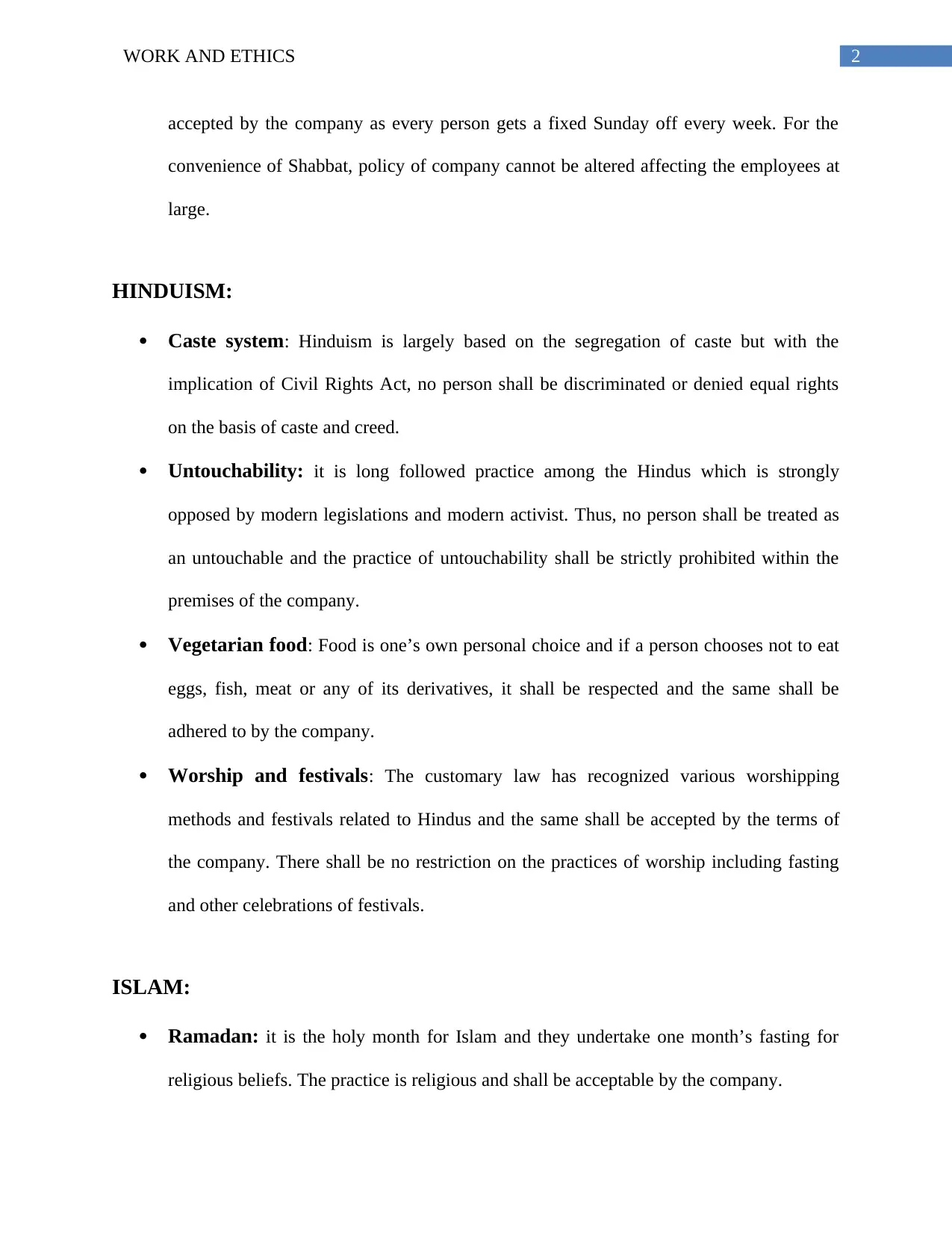
2WORK AND ETHICS
accepted by the company as every person gets a fixed Sunday off every week. For the
convenience of Shabbat, policy of company cannot be altered affecting the employees at
large.
HINDUISM:
Caste system: Hinduism is largely based on the segregation of caste but with the
implication of Civil Rights Act, no person shall be discriminated or denied equal rights
on the basis of caste and creed.
Untouchability: it is long followed practice among the Hindus which is strongly
opposed by modern legislations and modern activist. Thus, no person shall be treated as
an untouchable and the practice of untouchability shall be strictly prohibited within the
premises of the company.
Vegetarian food: Food is one’s own personal choice and if a person chooses not to eat
eggs, fish, meat or any of its derivatives, it shall be respected and the same shall be
adhered to by the company.
Worship and festivals: The customary law has recognized various worshipping
methods and festivals related to Hindus and the same shall be accepted by the terms of
the company. There shall be no restriction on the practices of worship including fasting
and other celebrations of festivals.
ISLAM:
Ramadan: it is the holy month for Islam and they undertake one month’s fasting for
religious beliefs. The practice is religious and shall be acceptable by the company.
accepted by the company as every person gets a fixed Sunday off every week. For the
convenience of Shabbat, policy of company cannot be altered affecting the employees at
large.
HINDUISM:
Caste system: Hinduism is largely based on the segregation of caste but with the
implication of Civil Rights Act, no person shall be discriminated or denied equal rights
on the basis of caste and creed.
Untouchability: it is long followed practice among the Hindus which is strongly
opposed by modern legislations and modern activist. Thus, no person shall be treated as
an untouchable and the practice of untouchability shall be strictly prohibited within the
premises of the company.
Vegetarian food: Food is one’s own personal choice and if a person chooses not to eat
eggs, fish, meat or any of its derivatives, it shall be respected and the same shall be
adhered to by the company.
Worship and festivals: The customary law has recognized various worshipping
methods and festivals related to Hindus and the same shall be accepted by the terms of
the company. There shall be no restriction on the practices of worship including fasting
and other celebrations of festivals.
ISLAM:
Ramadan: it is the holy month for Islam and they undertake one month’s fasting for
religious beliefs. The practice is religious and shall be acceptable by the company.
⊘ This is a preview!⊘
Do you want full access?
Subscribe today to unlock all pages.

Trusted by 1+ million students worldwide
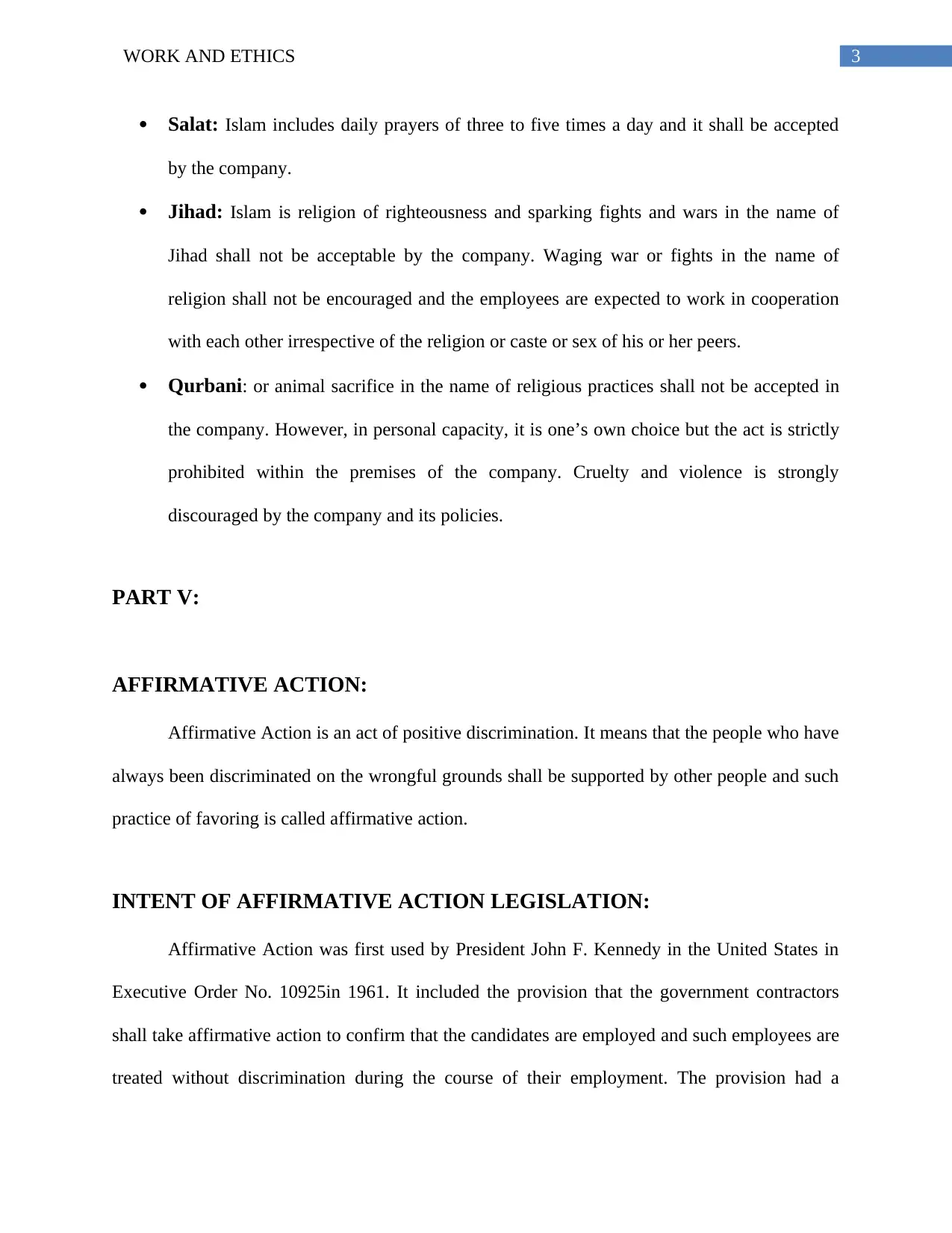
3WORK AND ETHICS
Salat: Islam includes daily prayers of three to five times a day and it shall be accepted
by the company.
Jihad: Islam is religion of righteousness and sparking fights and wars in the name of
Jihad shall not be acceptable by the company. Waging war or fights in the name of
religion shall not be encouraged and the employees are expected to work in cooperation
with each other irrespective of the religion or caste or sex of his or her peers.
Qurbani: or animal sacrifice in the name of religious practices shall not be accepted in
the company. However, in personal capacity, it is one’s own choice but the act is strictly
prohibited within the premises of the company. Cruelty and violence is strongly
discouraged by the company and its policies.
PART V:
AFFIRMATIVE ACTION:
Affirmative Action is an act of positive discrimination. It means that the people who have
always been discriminated on the wrongful grounds shall be supported by other people and such
practice of favoring is called affirmative action.
INTENT OF AFFIRMATIVE ACTION LEGISLATION:
Affirmative Action was first used by President John F. Kennedy in the United States in
Executive Order No. 10925in 1961. It included the provision that the government contractors
shall take affirmative action to confirm that the candidates are employed and such employees are
treated without discrimination during the course of their employment. The provision had a
Salat: Islam includes daily prayers of three to five times a day and it shall be accepted
by the company.
Jihad: Islam is religion of righteousness and sparking fights and wars in the name of
Jihad shall not be acceptable by the company. Waging war or fights in the name of
religion shall not be encouraged and the employees are expected to work in cooperation
with each other irrespective of the religion or caste or sex of his or her peers.
Qurbani: or animal sacrifice in the name of religious practices shall not be accepted in
the company. However, in personal capacity, it is one’s own choice but the act is strictly
prohibited within the premises of the company. Cruelty and violence is strongly
discouraged by the company and its policies.
PART V:
AFFIRMATIVE ACTION:
Affirmative Action is an act of positive discrimination. It means that the people who have
always been discriminated on the wrongful grounds shall be supported by other people and such
practice of favoring is called affirmative action.
INTENT OF AFFIRMATIVE ACTION LEGISLATION:
Affirmative Action was first used by President John F. Kennedy in the United States in
Executive Order No. 10925in 1961. It included the provision that the government contractors
shall take affirmative action to confirm that the candidates are employed and such employees are
treated without discrimination during the course of their employment. The provision had a
Paraphrase This Document
Need a fresh take? Get an instant paraphrase of this document with our AI Paraphraser
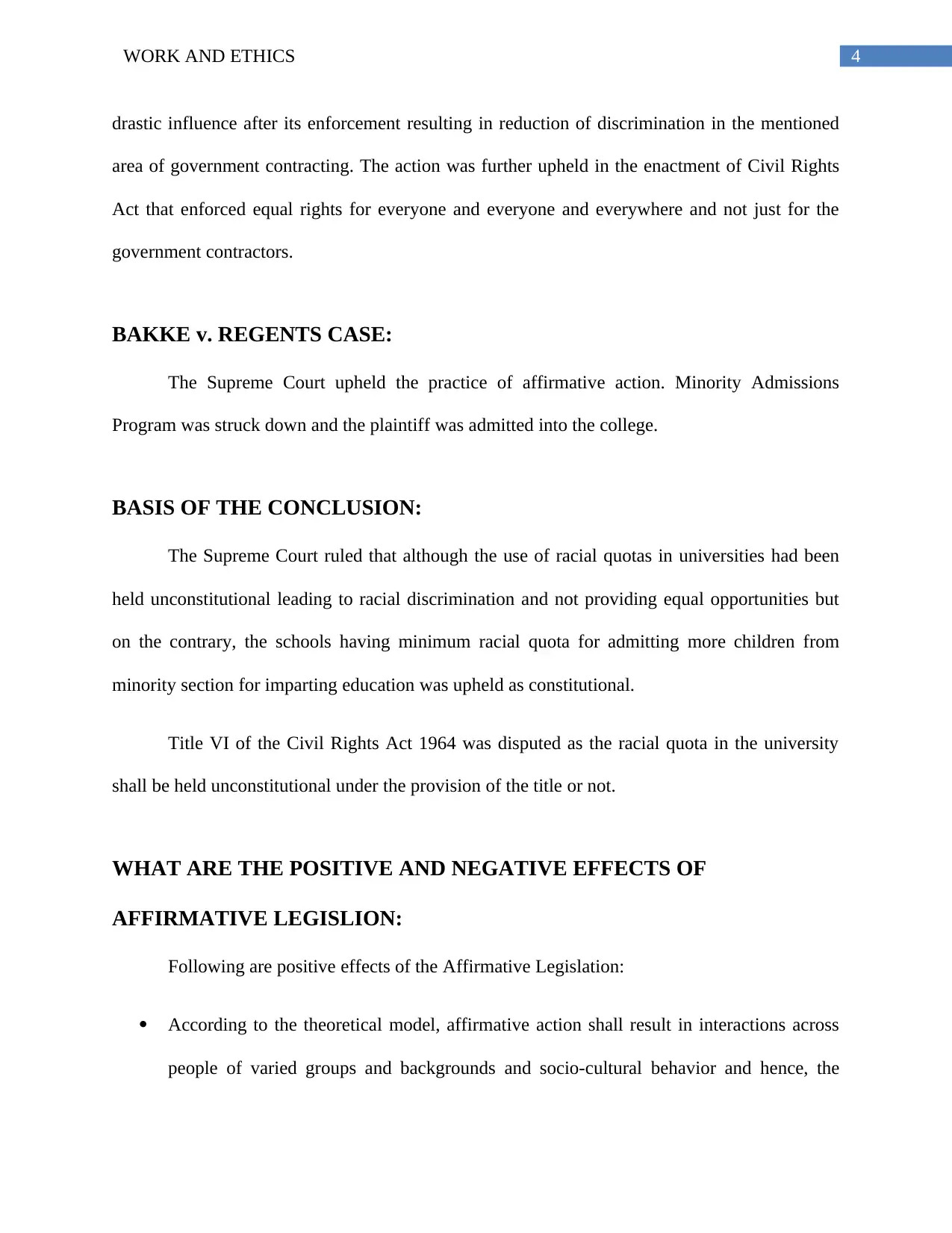
4WORK AND ETHICS
drastic influence after its enforcement resulting in reduction of discrimination in the mentioned
area of government contracting. The action was further upheld in the enactment of Civil Rights
Act that enforced equal rights for everyone and everyone and everywhere and not just for the
government contractors.
BAKKE v. REGENTS CASE:
The Supreme Court upheld the practice of affirmative action. Minority Admissions
Program was struck down and the plaintiff was admitted into the college.
BASIS OF THE CONCLUSION:
The Supreme Court ruled that although the use of racial quotas in universities had been
held unconstitutional leading to racial discrimination and not providing equal opportunities but
on the contrary, the schools having minimum racial quota for admitting more children from
minority section for imparting education was upheld as constitutional.
Title VI of the Civil Rights Act 1964 was disputed as the racial quota in the university
shall be held unconstitutional under the provision of the title or not.
WHAT ARE THE POSITIVE AND NEGATIVE EFFECTS OF
AFFIRMATIVE LEGISLION:
Following are positive effects of the Affirmative Legislation:
According to the theoretical model, affirmative action shall result in interactions across
people of varied groups and backgrounds and socio-cultural behavior and hence, the
drastic influence after its enforcement resulting in reduction of discrimination in the mentioned
area of government contracting. The action was further upheld in the enactment of Civil Rights
Act that enforced equal rights for everyone and everyone and everywhere and not just for the
government contractors.
BAKKE v. REGENTS CASE:
The Supreme Court upheld the practice of affirmative action. Minority Admissions
Program was struck down and the plaintiff was admitted into the college.
BASIS OF THE CONCLUSION:
The Supreme Court ruled that although the use of racial quotas in universities had been
held unconstitutional leading to racial discrimination and not providing equal opportunities but
on the contrary, the schools having minimum racial quota for admitting more children from
minority section for imparting education was upheld as constitutional.
Title VI of the Civil Rights Act 1964 was disputed as the racial quota in the university
shall be held unconstitutional under the provision of the title or not.
WHAT ARE THE POSITIVE AND NEGATIVE EFFECTS OF
AFFIRMATIVE LEGISLION:
Following are positive effects of the Affirmative Legislation:
According to the theoretical model, affirmative action shall result in interactions across
people of varied groups and backgrounds and socio-cultural behavior and hence, the
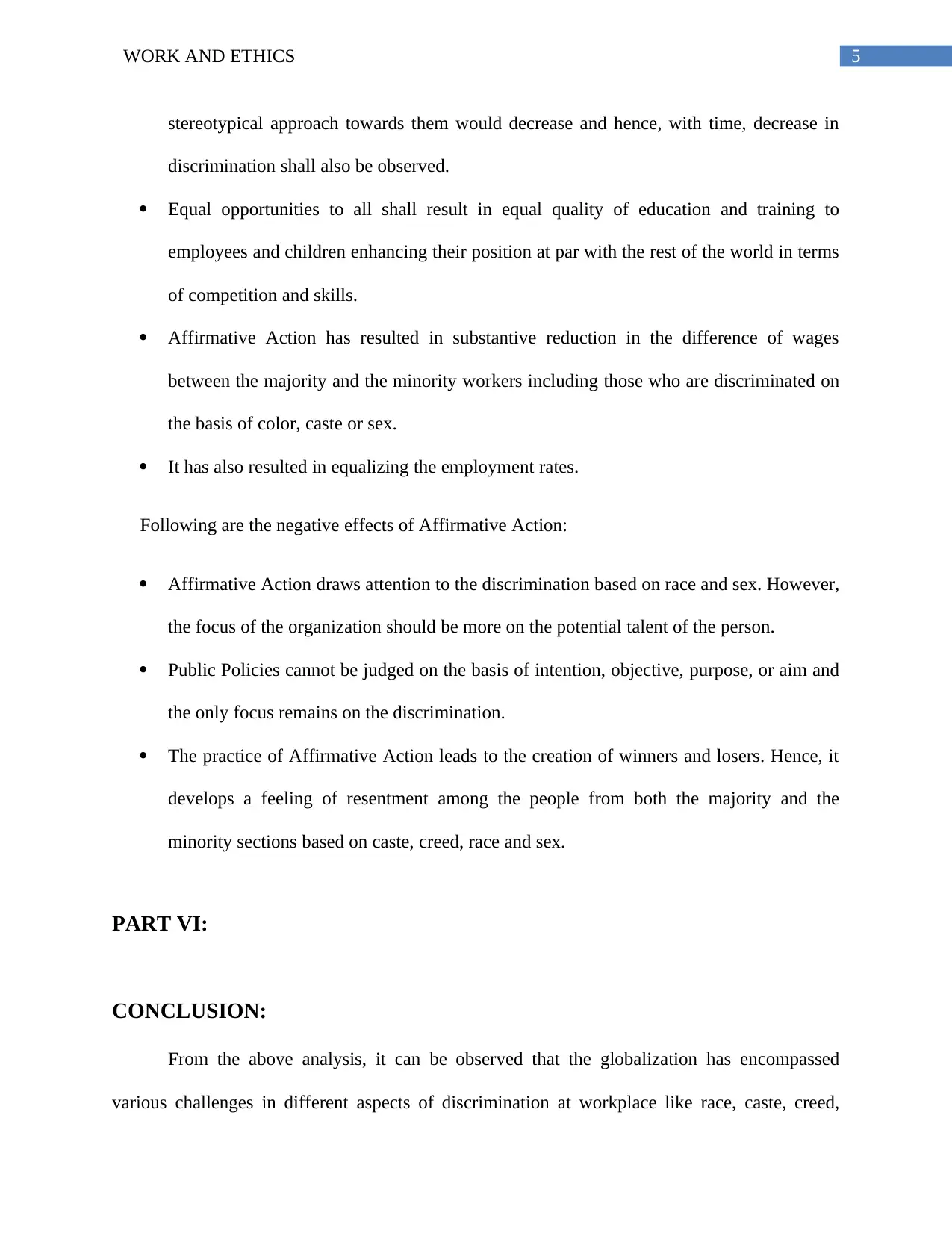
5WORK AND ETHICS
stereotypical approach towards them would decrease and hence, with time, decrease in
discrimination shall also be observed.
Equal opportunities to all shall result in equal quality of education and training to
employees and children enhancing their position at par with the rest of the world in terms
of competition and skills.
Affirmative Action has resulted in substantive reduction in the difference of wages
between the majority and the minority workers including those who are discriminated on
the basis of color, caste or sex.
It has also resulted in equalizing the employment rates.
Following are the negative effects of Affirmative Action:
Affirmative Action draws attention to the discrimination based on race and sex. However,
the focus of the organization should be more on the potential talent of the person.
Public Policies cannot be judged on the basis of intention, objective, purpose, or aim and
the only focus remains on the discrimination.
The practice of Affirmative Action leads to the creation of winners and losers. Hence, it
develops a feeling of resentment among the people from both the majority and the
minority sections based on caste, creed, race and sex.
PART VI:
CONCLUSION:
From the above analysis, it can be observed that the globalization has encompassed
various challenges in different aspects of discrimination at workplace like race, caste, creed,
stereotypical approach towards them would decrease and hence, with time, decrease in
discrimination shall also be observed.
Equal opportunities to all shall result in equal quality of education and training to
employees and children enhancing their position at par with the rest of the world in terms
of competition and skills.
Affirmative Action has resulted in substantive reduction in the difference of wages
between the majority and the minority workers including those who are discriminated on
the basis of color, caste or sex.
It has also resulted in equalizing the employment rates.
Following are the negative effects of Affirmative Action:
Affirmative Action draws attention to the discrimination based on race and sex. However,
the focus of the organization should be more on the potential talent of the person.
Public Policies cannot be judged on the basis of intention, objective, purpose, or aim and
the only focus remains on the discrimination.
The practice of Affirmative Action leads to the creation of winners and losers. Hence, it
develops a feeling of resentment among the people from both the majority and the
minority sections based on caste, creed, race and sex.
PART VI:
CONCLUSION:
From the above analysis, it can be observed that the globalization has encompassed
various challenges in different aspects of discrimination at workplace like race, caste, creed,
⊘ This is a preview!⊘
Do you want full access?
Subscribe today to unlock all pages.

Trusted by 1+ million students worldwide
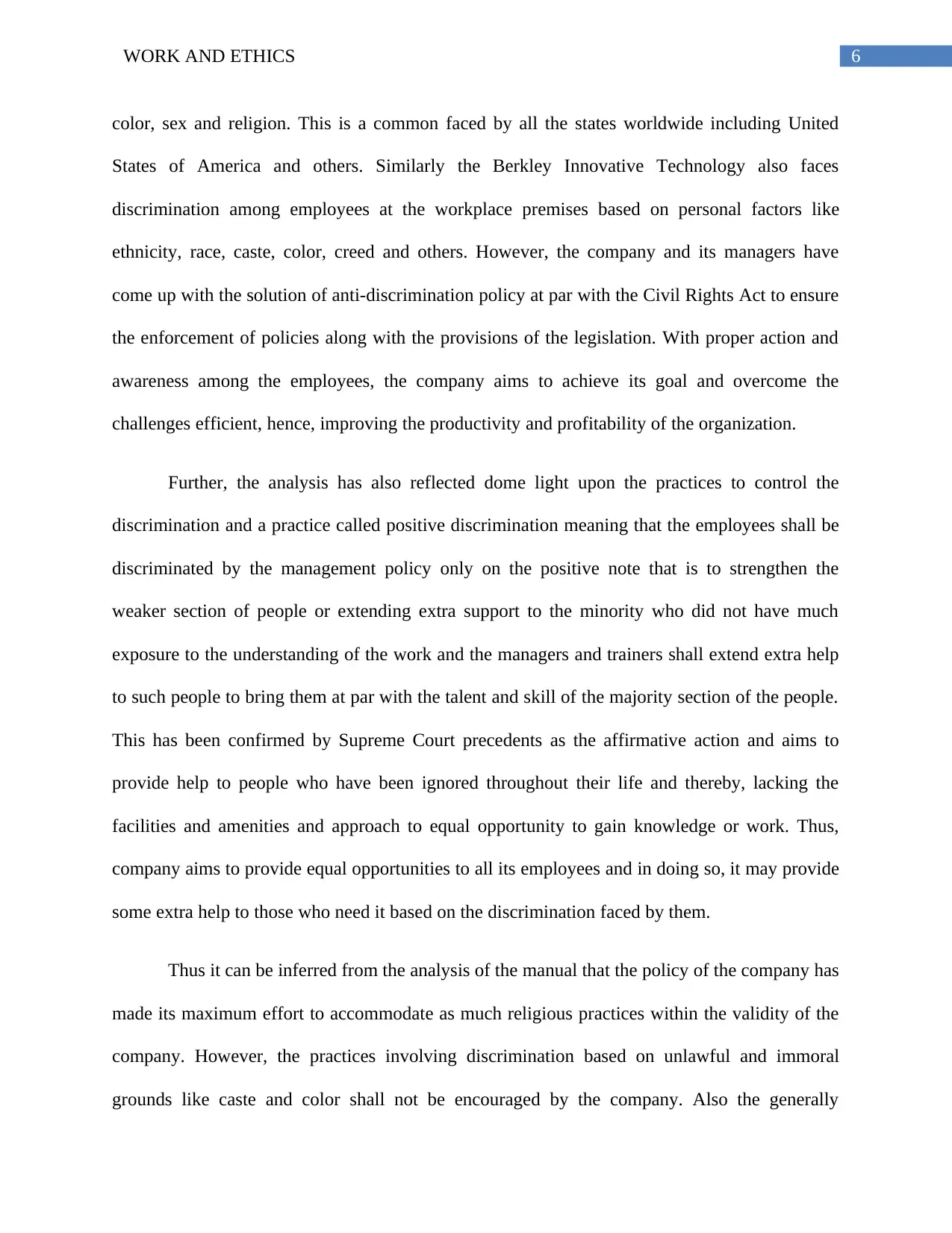
6WORK AND ETHICS
color, sex and religion. This is a common faced by all the states worldwide including United
States of America and others. Similarly the Berkley Innovative Technology also faces
discrimination among employees at the workplace premises based on personal factors like
ethnicity, race, caste, color, creed and others. However, the company and its managers have
come up with the solution of anti-discrimination policy at par with the Civil Rights Act to ensure
the enforcement of policies along with the provisions of the legislation. With proper action and
awareness among the employees, the company aims to achieve its goal and overcome the
challenges efficient, hence, improving the productivity and profitability of the organization.
Further, the analysis has also reflected dome light upon the practices to control the
discrimination and a practice called positive discrimination meaning that the employees shall be
discriminated by the management policy only on the positive note that is to strengthen the
weaker section of people or extending extra support to the minority who did not have much
exposure to the understanding of the work and the managers and trainers shall extend extra help
to such people to bring them at par with the talent and skill of the majority section of the people.
This has been confirmed by Supreme Court precedents as the affirmative action and aims to
provide help to people who have been ignored throughout their life and thereby, lacking the
facilities and amenities and approach to equal opportunity to gain knowledge or work. Thus,
company aims to provide equal opportunities to all its employees and in doing so, it may provide
some extra help to those who need it based on the discrimination faced by them.
Thus it can be inferred from the analysis of the manual that the policy of the company has
made its maximum effort to accommodate as much religious practices within the validity of the
company. However, the practices involving discrimination based on unlawful and immoral
grounds like caste and color shall not be encouraged by the company. Also the generally
color, sex and religion. This is a common faced by all the states worldwide including United
States of America and others. Similarly the Berkley Innovative Technology also faces
discrimination among employees at the workplace premises based on personal factors like
ethnicity, race, caste, color, creed and others. However, the company and its managers have
come up with the solution of anti-discrimination policy at par with the Civil Rights Act to ensure
the enforcement of policies along with the provisions of the legislation. With proper action and
awareness among the employees, the company aims to achieve its goal and overcome the
challenges efficient, hence, improving the productivity and profitability of the organization.
Further, the analysis has also reflected dome light upon the practices to control the
discrimination and a practice called positive discrimination meaning that the employees shall be
discriminated by the management policy only on the positive note that is to strengthen the
weaker section of people or extending extra support to the minority who did not have much
exposure to the understanding of the work and the managers and trainers shall extend extra help
to such people to bring them at par with the talent and skill of the majority section of the people.
This has been confirmed by Supreme Court precedents as the affirmative action and aims to
provide help to people who have been ignored throughout their life and thereby, lacking the
facilities and amenities and approach to equal opportunity to gain knowledge or work. Thus,
company aims to provide equal opportunities to all its employees and in doing so, it may provide
some extra help to those who need it based on the discrimination faced by them.
Thus it can be inferred from the analysis of the manual that the policy of the company has
made its maximum effort to accommodate as much religious practices within the validity of the
company. However, the practices involving discrimination based on unlawful and immoral
grounds like caste and color shall not be encouraged by the company. Also the generally
Paraphrase This Document
Need a fresh take? Get an instant paraphrase of this document with our AI Paraphraser
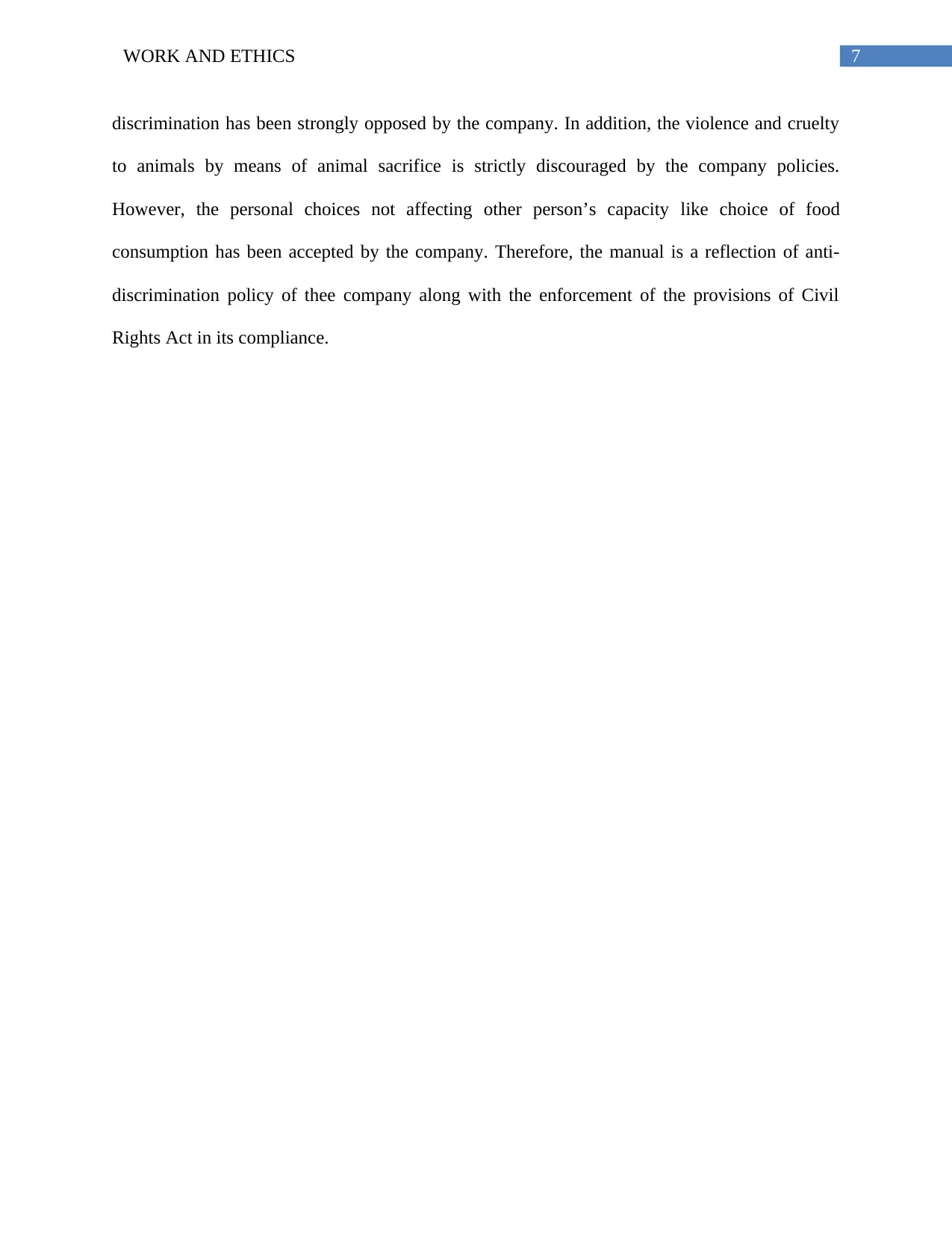
7WORK AND ETHICS
discrimination has been strongly opposed by the company. In addition, the violence and cruelty
to animals by means of animal sacrifice is strictly discouraged by the company policies.
However, the personal choices not affecting other person’s capacity like choice of food
consumption has been accepted by the company. Therefore, the manual is a reflection of anti-
discrimination policy of thee company along with the enforcement of the provisions of Civil
Rights Act in its compliance.
discrimination has been strongly opposed by the company. In addition, the violence and cruelty
to animals by means of animal sacrifice is strictly discouraged by the company policies.
However, the personal choices not affecting other person’s capacity like choice of food
consumption has been accepted by the company. Therefore, the manual is a reflection of anti-
discrimination policy of thee company along with the enforcement of the provisions of Civil
Rights Act in its compliance.
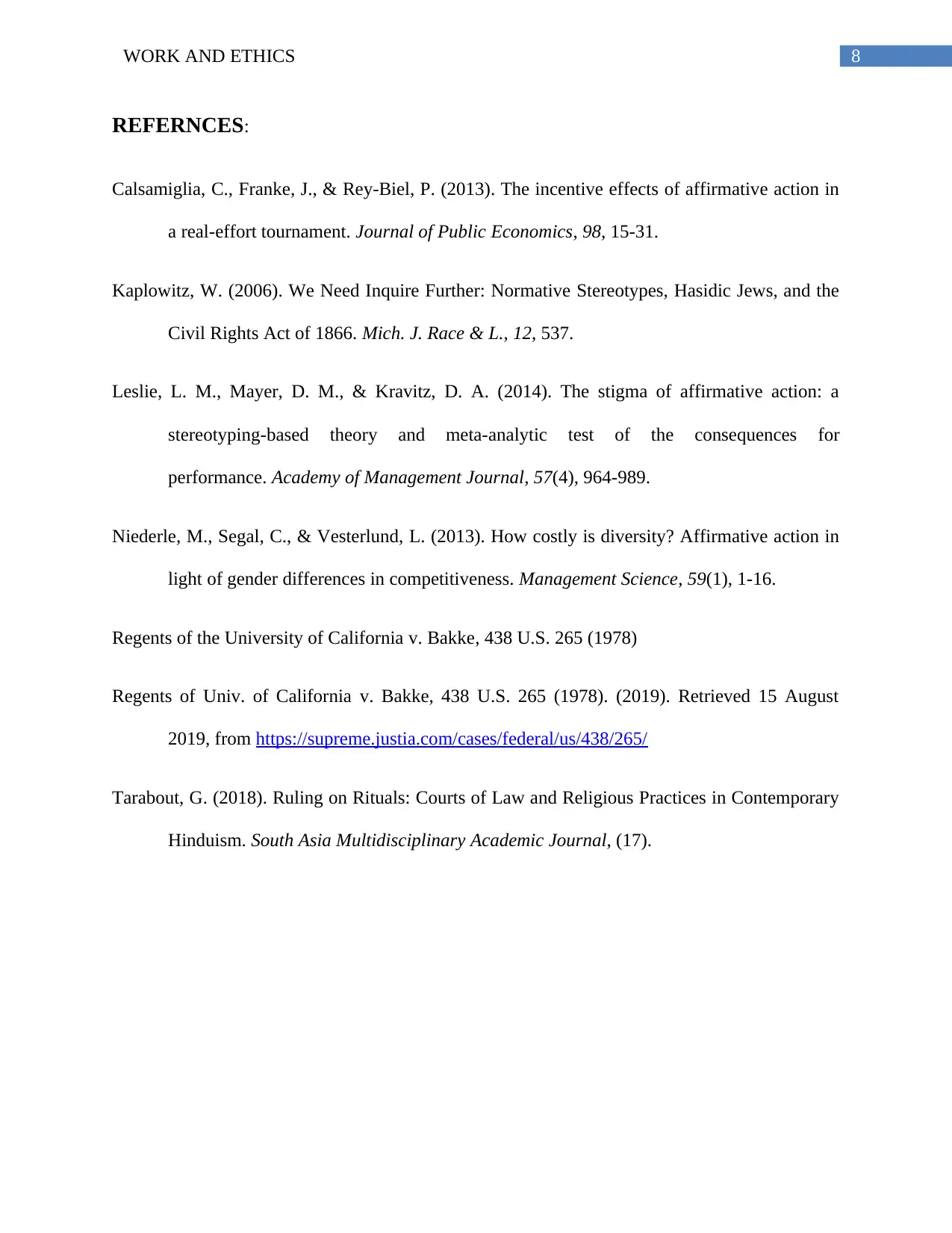
8WORK AND ETHICS
REFERNCES:
Calsamiglia, C., Franke, J., & Rey-Biel, P. (2013). The incentive effects of affirmative action in
a real-effort tournament. Journal of Public Economics, 98, 15-31.
Kaplowitz, W. (2006). We Need Inquire Further: Normative Stereotypes, Hasidic Jews, and the
Civil Rights Act of 1866. Mich. J. Race & L., 12, 537.
Leslie, L. M., Mayer, D. M., & Kravitz, D. A. (2014). The stigma of affirmative action: a
stereotyping-based theory and meta-analytic test of the consequences for
performance. Academy of Management Journal, 57(4), 964-989.
Niederle, M., Segal, C., & Vesterlund, L. (2013). How costly is diversity? Affirmative action in
light of gender differences in competitiveness. Management Science, 59(1), 1-16.
Regents of the University of California v. Bakke, 438 U.S. 265 (1978)
Regents of Univ. of California v. Bakke, 438 U.S. 265 (1978). (2019). Retrieved 15 August
2019, from https://supreme.justia.com/cases/federal/us/438/265/
Tarabout, G. (2018). Ruling on Rituals: Courts of Law and Religious Practices in Contemporary
Hinduism. South Asia Multidisciplinary Academic Journal, (17).
REFERNCES:
Calsamiglia, C., Franke, J., & Rey-Biel, P. (2013). The incentive effects of affirmative action in
a real-effort tournament. Journal of Public Economics, 98, 15-31.
Kaplowitz, W. (2006). We Need Inquire Further: Normative Stereotypes, Hasidic Jews, and the
Civil Rights Act of 1866. Mich. J. Race & L., 12, 537.
Leslie, L. M., Mayer, D. M., & Kravitz, D. A. (2014). The stigma of affirmative action: a
stereotyping-based theory and meta-analytic test of the consequences for
performance. Academy of Management Journal, 57(4), 964-989.
Niederle, M., Segal, C., & Vesterlund, L. (2013). How costly is diversity? Affirmative action in
light of gender differences in competitiveness. Management Science, 59(1), 1-16.
Regents of the University of California v. Bakke, 438 U.S. 265 (1978)
Regents of Univ. of California v. Bakke, 438 U.S. 265 (1978). (2019). Retrieved 15 August
2019, from https://supreme.justia.com/cases/federal/us/438/265/
Tarabout, G. (2018). Ruling on Rituals: Courts of Law and Religious Practices in Contemporary
Hinduism. South Asia Multidisciplinary Academic Journal, (17).
⊘ This is a preview!⊘
Do you want full access?
Subscribe today to unlock all pages.

Trusted by 1+ million students worldwide
1 out of 9
Your All-in-One AI-Powered Toolkit for Academic Success.
+13062052269
info@desklib.com
Available 24*7 on WhatsApp / Email
![[object Object]](/_next/static/media/star-bottom.7253800d.svg)
Unlock your academic potential
Copyright © 2020–2026 A2Z Services. All Rights Reserved. Developed and managed by ZUCOL.